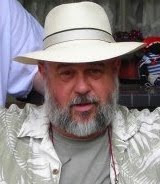The first time I ever set foot in Wichita was to deliver to Mid-Continent Airport a tall, lanky, New York jew with a huge afro and the hands of a basketball player. David McMullin was at the wheel. Michael Totty, Don Sarlin and I were crammed in the back seat. The year was 1971 and the guy with the monstrous hands was David Bromberg. Watching those fingers curl over his knees and extend toward his shins gave me a little insight into just how the man on the other end of those formidable digits had hammered, coerced, bamboozled and simply annihilated every possible combination of notes from a 00 Martin just a few hours earlier. That he and another guitarist by the name of Dan Crary had just set the stage for the first and most enduring flat-picking contest in the whole country was nowhere apparent. That we were in the presence of greatness, was everywhere.
I only ended up in Winfield for the weekend because my best friend from High School, the aforementioned Mr. Totty, was attending Southwestern College, and had invited me up for a folk festival he was helping organize. My young bride, Sheila and I hitchhiked up from our hometown, Oklahoma City, people did that in those days. We did alright on the Interstate, but took a while to get from I-35 over to the Cowley County seat. We arrived late and walked into the field house just as Pat and Victoria Garvey were singing "The Trail of Tears", a beautiful and haunting song about the displacement of the Creek, Choctaw, Cherokee and Chickasaw Nations - a song that I still perform today. That Sheila was a member of the Chickasaw Nation made the song all the more powerful. I was mesmerized. They moved on to "Song for Kansas" which is hands down the best Kansas song ever, a song I also still sing. By the end of that second song, a die had been cast, and a life in song had been laid out before me, a life I embraced but took years to fulfill, a destiny that I was only slowly able to live up to. There was a lot of music to get through first.
What I thought was the final act that night at Stewart Gymnasium, having arrived late and not seen a program, was a clean-cut Kansas City dude - conservatively dressed, with a neatly trimmed moustache and muleskin cowboy boots polished to a high sheen. However, for all of his quiet appearance, Dan Crary was doing something that I just hadn't ever heard before - playing fiddle tunes on the guitar. Note for blazing note. He carried Billy through the lowground and came back with a blackberry blossom. His "Moonlight On The Water" was only two things, moonlight and water. Ushers had to come through and remove all the jaws from the floor. (meanwhile, I was still pondering what the other chord was that went with "G" and "C").
Turns out Dan wasn't last. That's when that 6 foot 5 inch New Yorker, with another eight inches of hair on top on that, strode to the middle of the stage in maybe three steps. All the ravages of memory not withstanding, I still remember his exact words, "Man, I'd have to be a fool to follow that guy with a fiddle tune ... but I don't look this way for nothing!" Here, whatever memory served me up to that point is lost in an oblivion of melodies both sacred and profane, sensuous and nearly senseless, active surgical removal of all twelve guitar notes so they could be reinstalled in another universe, on another freight train to oblivion, a rubber-tired taxi to the stars. I can't name a single song he played, but this Bromberg fellow sure knew how to shake down a Mid-Western folk festival audience and leave them with just their skivies and their rapidly dissolving notions of the pure simplicity of mountain music. When he was done, the crickets packed up their fiddles and went home, the tree frogs gave up in disgust, and the whippoorwill moved his home a few miles farther south, just in case this fool ever came back.
For all that, the night wasn't over. Mr. Crary was still to grace the stage one more time, this time alongside the slightly manic Tarrytown boy last seen taking the train to Harlem for his guitar lesson with the Reverend, Gary Davis. The two young men might just as well have taken a big ole Kansas twister down off of God's shelf and said "Hey, this is mine - I forgot I left it here". Extra staff had to be called in to replace lights knocked out by the flying notes. Lifetime quests were forgotten in search of discordant chord patterns that it would take David Rawlings thirty years to discover. Seismographic readings started to resemble the melody line for "The Boggy Road To Milledgeville".
But hey. That was only the concert. The party that night at Stu's house is where it all took place. Hell, the devil wouldn't stop in Georgia, and you know it. Two men. Two masters from different universes. A contest was born that night - that's what men do.
Saturday, September 1, 2007
Subscribe to:
Post Comments (Atom)

No comments:
Post a Comment